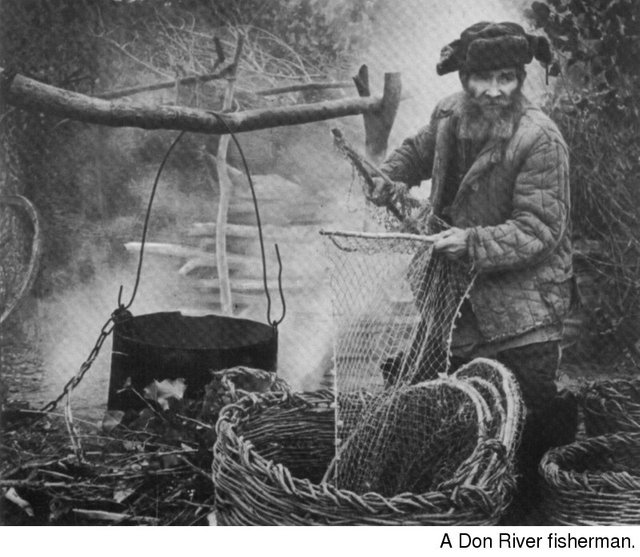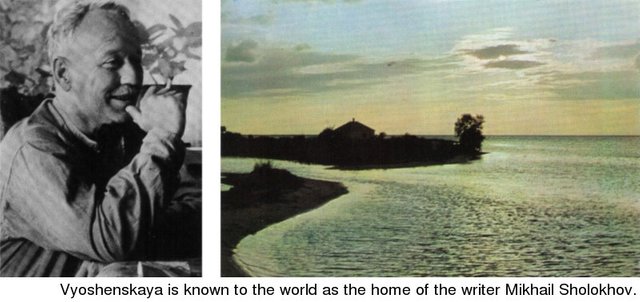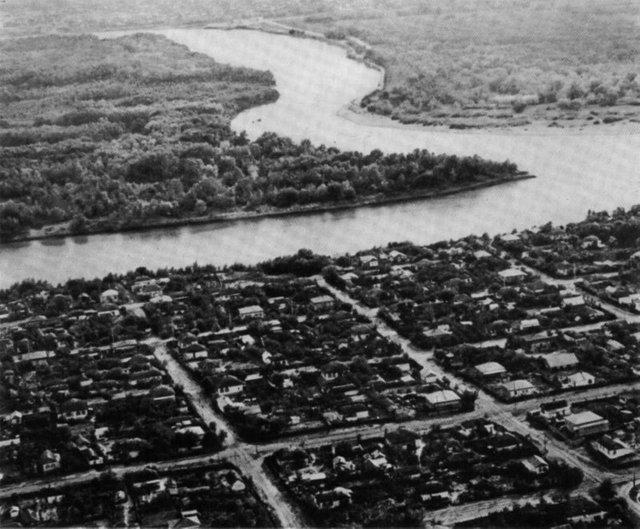The Quiet Don (featuring Vasily Peskov as author)
The Don River has its source near the city of Tula. I tossed a chip into the water and walked along the bank, having no trouble in keeping up with the current of the small stream as it made its way through the reeds. A flock of geese would be cramped here, though large white ships that resembled a flock of geese were moored close to each other on the same river near Rostov. Here, too, however, a chip tossed into the water will not overtake a pedestrian.
The Quiet Don gathers its tribute from the equally slow-moving streams and rivers of Tula, Voronezh, Tambov and Penza regions, turning gradually into a great river with a total length of nearly two thousand kilometers. The Don has its source in birch copses, flows through fir and oak groves and then, leaving the forest regions, cuts across the steppes. In its middle region the steppe ends at the river bank. The chalk cliffs of Divnogorye offer a fine view of the misty turns of the river. The banks are heady with the scent of wormwood and sweetclover. Grass dotted with-the tiny yellow flowers of sweetclover has an unforgettable, tantalizing aroma. In times gone by Don Cossacks in foreign lands recognized each other by the scent of sweetclover mixed in with their tobacco.

From the cliffs one can see the river boats, barges, fishing boats and the swift hydrofoil Raketa ships. Ospreys fly over the water, hunting for fish. The lights of. the buoys are reflected in the still waters at night. Even in this age of technology one can spot a rider watering his horse near the bank.
There are no insignificant rivers on earth, for even the smallest trickle can quench one's thirst. If the stream is a bit larger, a herd can be watered, a fisherman will show up and people can relax and bathe here.
From the very beginning, all living things have been drawn to water. The fate of a dozen villages may depend on a small stream, while there are rivers whose fate has become one with the fate of the people. Such are the Volga, the Dnieper, the Amu Darya, the Yenisei and the Angara. Such, too, is the Don.
Kostenki Village is located in the upper reaches of the Don, near Voronezh. One can wonder at its age, knowing that when digging in the garden people often come up with ancient human bones and the teeth of bison, deer, tigers and rhinoceroses. Burial mounds and prehistoric stone statues called babas rise silently in the steppes. The chalk cliffs are dotted with the caves of monks, robbers' lairs and the hiding places of rebels. There are gravesites of the Civil War, marked by red stars, and more recent trenches, now overgrown with wormwood and sweetclover. All are echoes of life and of the struggles and passions that seethed here on the banks of the quiet river. The first Russian ships from Voronezh sailed down the Don to the sea. Two hundred and fifty years later an atomic power station was built near the site of the first shipyards. The Don has been joined by a waterway with the Volga. Life, as the water in rivers, cannot stand still, and yet, one can today traverse the Don from its source to the Sea of Azov in a little boat not unlike the Cossack dugouts of yore. As in olden times, one still sees the piers piled high with watermelons in autumn or a creaking old ferry, or men on horseback riding along the bank, singing, as the Don Cossacks have always sung.
There is something indefinable that binds a person to the place where he has grown up. A man who has been reared in the mountains is by nature quite unlike one who has grown up in the plains. A woodsman feels out of place in the vast open spaces of the steppes. When climbing in the Caucasus one day my Abkhasian companion touched my arm and said, "Listen. Can you hear the river churning?" I knew what he meant, but being a man of the plains, I felt closer to the quiet, calm waters that reflect the sky, the trees and birds on the wing. Different songs are sung along different banks. Quiet waters give rise to gentle, soulful songs.

The Don has its own bard, a man who has made the river famous all over the world as far more than a geographical place name. He is Mikhail Sholokhov, arid the title, of his epic song is And Quiet Flows the Don. The title reflects the nature of the river and, by contrast, the scope of the human storm that raged on its banks. This, one of the best books of our century, portrays a people at turning point in their history. However, the river, whose still waters reflect the sky, the reed-covered cottages, the boats, horses, faces and bursting shells, is one of the main characters of the book.
